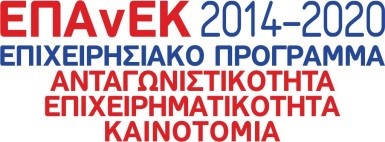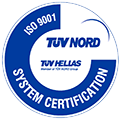1.GENERAL INFORMATION ON TRANSNATIONAL COOPERATION
The GSRI transnational cooperation projects form an integral part of its general role in shaping and strengthening research policies and enhancing the outward orientation of the Greek research and innovation ecosystem. They cover a wide range of bilateral, trilateral and multilateral activities.
Through its involvement, Greece seeks to establish a strong presence both, from a geopolitical aspect, in its immediate neighborhood (Adriatic Sea, Balkans, Black Sea, South-East Mediterranean) and with regard to its strategic partners (principally the EU), as well as to create links with countries possessing a strong R&T system (e.g. Israel) or countries holding considerable global sway (e.g. China).
The GSRI is a channel for international cooperation and a source of funding for state-of-the-art interdisciplinary programmes; it contributes to the establishment of solid international relations in R&T and acts as an ambassador of Greece in international R&T fora, as well as in international events in the field of research and innovation.
Transnational agreements in Research & Technology are a form of soft diplomacy or science diplomacy, as they focus exclusively on scientific fields, which, as a general rule, bring together collaborators (scientists or/and researchers) from the two, or more, participating countries, are not involved in international controversies and may lay a foundation for co-operation in other areas of common interest with each country.
Transnational cooperation projects are different from scientific and research cooperation at the EU level and/or between international organizations in that they are concluded between individual States and not between international networks or international organizations.
Projects are implemented in close cooperation and in synergy with the Ministry of Foreign Affairs, mainly during the conclusion and legal finalization phases, as well as for their parliamentary approval. The GSRI reports regularly to the Ministry of Foreign Affairs regarding its transnational activities and participates, as required by its role, in joint transnational committees, or other meetings, organized by said Ministry.
2. BILATERAL COOPERATION
A bilateral cooperation project is agreed between two countries, either following a request by the research and innovation communities of said countries or within the framework of a country’s foreign relations policy. In the latter case, it is initiated by the Ministry of Foreign Affairs.
It is based on a bilateral agreement signed between the two countries concerned which provides the legal basis for implementation of the cooperation project, as well as the general rules governing such project.
Bilateral cooperation projects are implemented through:
- Bilateral ministerial meetings setting out the conditions for a bilateral cooperation at the political level;
- A joint call for proposals, issued by both countries, with their respective competent ministries bearing the responsibility for joint (and equal, if possible) financing of research and innovation projects;
- Joint activities, such as workshops, brokerage events, expert meetings, etc., running in parallel with the joint call.
The main governing body of a bilateral cooperation is the Joint Committee, composed of political appointees and executive officers of the competent ministries, from both countries. The Joint Committee defines the rules which will govern the bilateral relation and the type of common-interest activities to be targeted for joint implementation. Joint Committee decisions are called Protocols and constitute the official texts of the bilateral cooperation.
The GSRI is currently co-financing joint research projects with Russia, Germany, Israel and China in the framework of bilateral cooperation.
Brief background and description of bilateral cooperation initiatives
3. TRILATERAL COOPERATION
Trilateral cooperation schemes are concluded between three countries and are usually an expression of higher-level political will by all three governments concerned. The Ministry of Foreign Affairs is the main coordinator and the participating sectors of public activity are determined at a senior political level.
Greece-Cyprus-Israel
The GSRI participates in the Greece-Cyprus-Israel trilateral cooperation scheme and contributed to the drafting and adoption of a Memorandum of Understanding (MoU) between the three countries, which was signed on 8/12/2016 in Jerusalem after conclusion of the three-way summit held between Greece, Cyprus and Israel and following the joint statement issued by the State leaders that same day, also in Jerusalem.
It is understood that the GSRI will participate in any other trilateral cooperation scheme (e.g. Greece-Cyprus-Egypt, Greece-Cyprus-Jordan, etc.) upon request from the Ministry of Foreign Affairs.
4. MULTILATERAL COOPERATION /ERANETs
Multilateral cooperation schemes are partnerships between more than three countries or between more than three scientific/research bodies of these countries.
A multilateral cooperation scheme can take various forms. It can be a cooperation at ministerial level (e.g. the Black Sea Economic Cooperation/B.S.E.C.) or a cooperation first decided at the European level (e.g. ERANETs) and subsequently implemented by researchers/scientists.
Black Sea Economic Cooperation (B.S.E.C.)
The Black Sea Economic Cooperation was established by 11 countries at a summit held in Istanbul in 1992. Greece is a founding member.
It is a political and economic initiative which, according to its statutory text, aims to foster interaction and harmonious relations between member countries, as well as to ensure peace, stability and prosperity and encourage friendly and good-neighbourly relations between countries in the Black Sea region. Its principal decision-making body is the Council of Ministers of Foreign Affairs.
The B.S.E.C. Headquarters and Secretariat are located in Istanbul (a Greek diplomat serves currently as Secretary General). Membership has grown to 12 countries since the accession of Serbia in 2004.
The GSRI participates in the Working Group for Research and Technology which is convened twice a year mainly for countries to exchange and share information and statistical data on R&T.
European Research Area Networks (ERANETs)
ERANETs (European Research Area Networks) are networks established on a voluntary basis bringing together scientists/researchers from cooperating European Union Member States (as well as from Member State research and/or university bodies and private sector bodies carrying out research), in order to jointly design and implement research activities of common interest with a thematic or/and geographical focus.
Call publication, evaluation and approval of proposals to be funded under ERANETs are carried out on two levels:
- a) European, and
- b) national level.
- European level
Member-States agree to assign the organization of joint calls, as well as management of activities in general, to an organization (coordinator) established in one of the ERANET participating countries, set to operate as the central Joint Call Secretariat.
Publication and communication of an ERANET call is carried out both at the level of its Joint Secretariat and at the level of the participating Member States; any country-specific conditions applicable in different Member States are laid out in an annex to the call.
Proposals are to be submitted to the ERANET Joint Secretariat.
Evaluation of proposals is performed at European level by an international evaluation committee, selected by the Joint Secretariat of each ERA-NET. Based on the proposals’ scoring, the evaluation committee produces a ranking list of proposals and recommends their funding to the Member States, provided that their score exceeds a pre-defined threshold.
Member-State participation in ERANETs and ERANET calls is validated through signature of a multilateral transnational networking agreement for each ERANET (MoU and document for government of the call and evaluation procedure), in which Member-States lay out the main rules for project implementation, the thematic priorities of the call, as well as the amount of funding to be contributed. In this same agreement, each Member State defines the specific rules applicable for entities within its territory, e.g. the grant amount, the bodies responsible for certification of expenditures (for Greece, that will be the GSRI), and any other specificities of the Member State concerned.
Proposals may also be co-funded under the HORIZON 2020 EU Framework Programme for Research and Innovation, with a 30% topping-up of the total public funding contributed by Member States. The top-up is not applicable to Member States eligible for access to structural funds, as is the case with Greece.
- National level
As already mentioned, ERANETs aim at the adoption of common procedures for the design and implementation of joint research activities and calls by participating Member States.
Funding by Member States is implemented through creation of a real or a virtual common pot for each ERANET. In the case of the so-called virtual common pot, Member States are not required to transfer national funds to the common pot, undertaking instead the obligation to finance participants in partnership projects within their territory, in accordance with the amount earmarked for this purpose. Greece participates in ERANETs funded through a virtual common pot and allocates EPAnEK funds to support Greek entities (research/university bodies or enterprises) taking part in approved projects.
Through ERANETs, participating Member States cover the implementation costs of research projects already selected for funding at the EU level, following a national call and a strict review/evaluation procedure, within the joint activities framework.
Projects are funded, at the national level, until full use of the budget contributed by each Member State and according to the eligibility rules applicable in the State concerned and included in the European call.

















